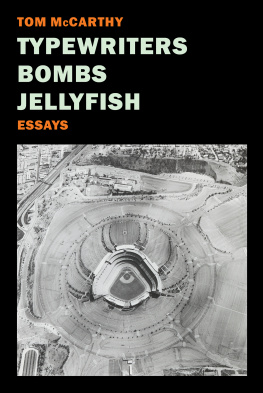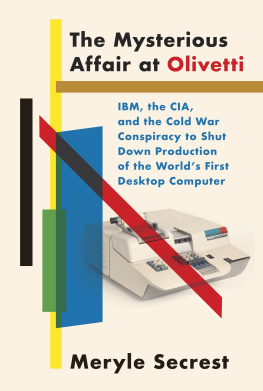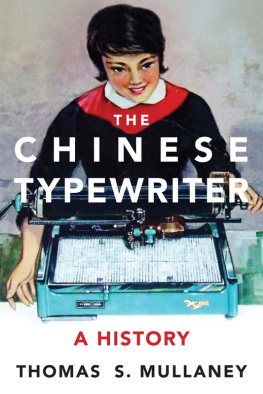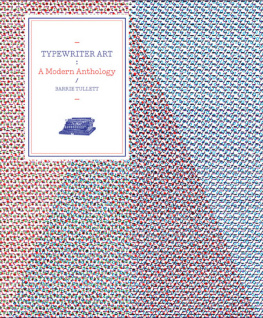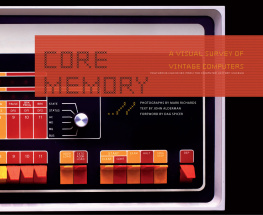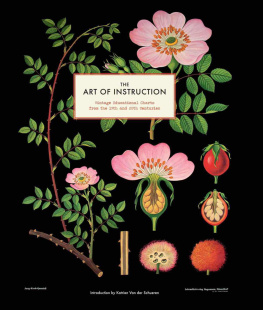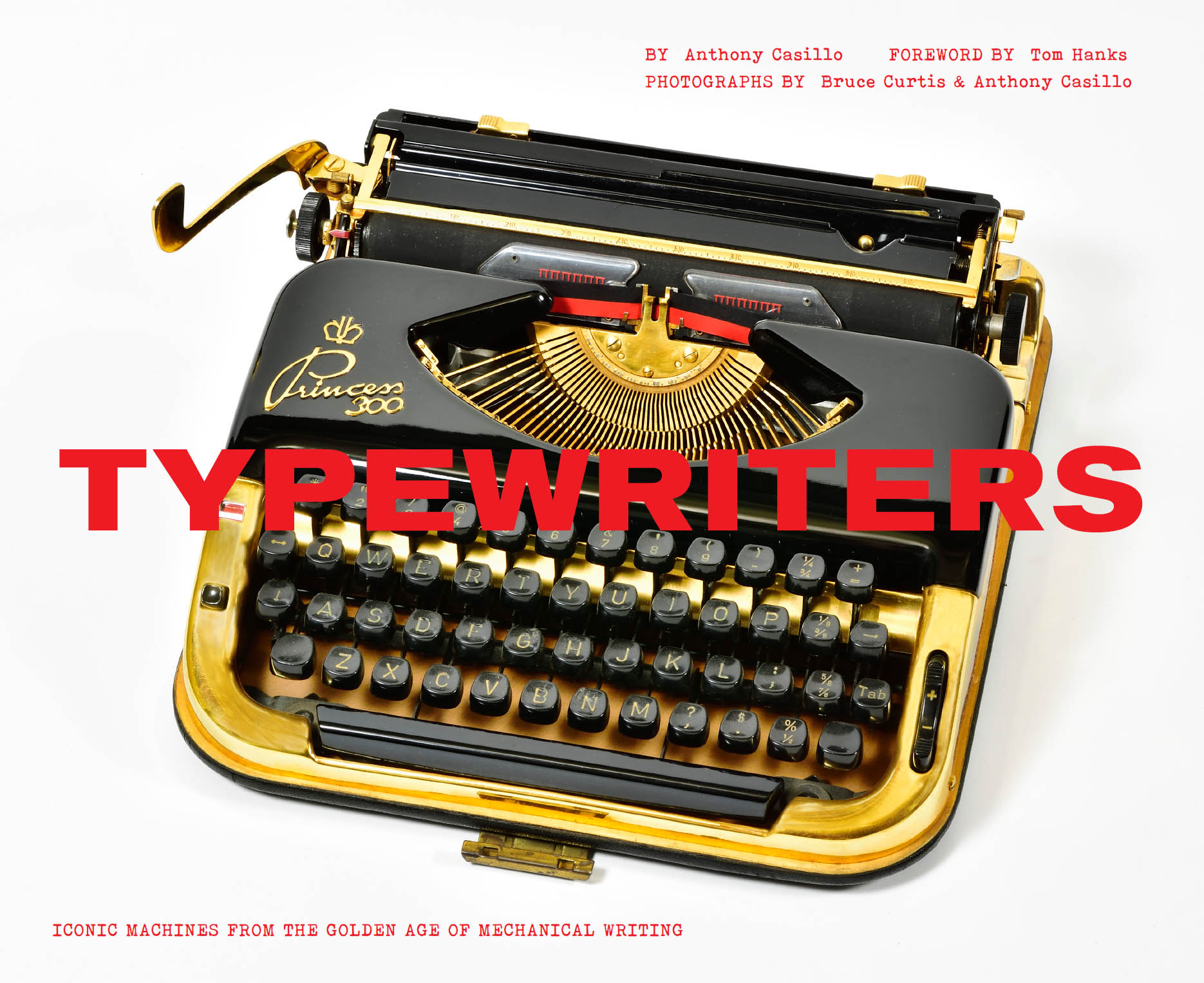


Text copyright 2017 by Anthony Casillo.
Foreword copyright 2017 by Tom Hanks.
Photography copyright 2017
by Bruce Curtis & Anthony Casillo.
All rights reserved. No part of this book may be reproduced in any form without written permission from the publisher.
ISBN 9781452155746 (epub, mobi)
Library of Congress Cataloging-in-Publication Data:
Names: Casillo, Anthony, author.
Title: Typewriters: iconic machines from the golden age of mechanical writing / Anthony Casillo ; photography by Bruce Curtis and Anthony Casillo.
Description: San Francisco : Chronicle Books, 2017. | Includes bibliographical references.
Identifiers: LCCN 2016044392 | ISBN 9781452154886
Subjects: LCSH: Typewriters.
Classification: LCC Z49.A1 C34 2017 | DDC 652.3dc23 LC record available at https://lccn.loc.gov/2016044392
Chronicle Books LLC
680 Second Street
San Francisco, California 94107
www.chroniclebooks.com
CONTENTS
ELEVEN REASONS TO USE A TYPEWRITER by Tom Hanks
There are only eleven reasons to use a typewriter:
1. Your penmanship is illegible. I mean, unreadable, so cocked-up and irregular that you use block printing and flowing script in the same five-letter word. The kind of handwriting that one of those legal experts would examine for a trial and say, Oh, hes guilty!
2. You cant afford or are just too thickheaded to figure out a computer.
3. Your religion forbids the use of machinery invented after 1867, when John Pratt came up with the Pterotype.
4. The Communists are back in power. Their technology sort of maxed out with space rockets and typewriters, and at about the same time.
5. You want the assurance that your letter/note/receipt/speech/test or quiz/school report will, most likely, be kept for a long time, perhaps forever. Its a fact: no one chucks anything typewritten into the trash after just one reading. E-mails? I delete most before I see the electronic signature.
6. You take great pleasure in the tactile experience of typingthe sound, the physical quality of touch, the report and action of type-bell-return, the carriage, and the satisfaction of pulling a completed page out of the machine, raaappp!
7. If what you are writing is lengthy, the distraction of rolling another page into the carriage allows you to collect your thoughts.
8. You are an artist, equal to Picasso, and everything you type is a one-of-a-kind work. The combination of paper quality, the age of the ribbon, the minute quirks of your machine, the occasional misuse of the space bar, and the options of the margins and tabs all add up to make anything you type as varied and unique as the thoughts in your head and the ridges of your fingerprints. Everything you type is a snowflake all its own.
9. You own a typewriter. It has been serviced and works just fine. The ribbon is fresh. You keep the machine out on a table at the correct height, not locked away in a closet still in its case. You have next to it a small stack of stationery and maybe some envelopes. The typewriter is ready and easy to use any time of the day.
10. You really want to bother the other customers at the coffee place.
11. Typewriter = Chick Magnet.
A COLLECTORS STORY
In the late 1970s, I stumbled upon an old, long abandoned, Oliver typewriter stored away in the back room of a typewriter repair shop where I worked in New York City. The Oliver was unlike anything I had ever seen before: an odd-shaped, green-colored monster with three rows of keys and typebarsU-shaped metal rods with type attached to thempositioned high above its carriage. It was old and deserving of greater appreciation than it was receiving there. It begged me to rescue it from that dark roomand potentially the trash heap. So, I packed the 30-lb (13.6-kg) orphan up and carried it home on the NYC subway during my standing-room-only rush-hour commute.
Once home, I began to explore this beauty a little further. The Oliver opened a door to a new world for me, one that ignited my curiosity about the early history of the typewriter. Before this point, I had never given a thought to the early days of the typewriter industry. Back then, interest in old typewriters was almost nonexistent and most machines were disposed of at the end of their useful lives.
Shortly after the Oliver discovery, I was leafing through the classified section of a monthly typewriter trade magazine when another vintage machine caught my eye: a Blickensderfer typewriter from the 1890s was being offered for sale. The Blickensderfer was a small manual typewriter that used a type element similar to the modern IBM Selectric typewriters that were popular in the 1970s. It was so much like the modern Selectric that I was repairing for a living back then, yet the seventy-five years that separated them made me curious about its history. There was so little information available on old typewriters at that time, so I acted on instinct, and I took a road trip across two states to purchase and pick up my prize. After all, I thought to myself, when would I ever see another one? On my return trip, a voice inside kept telling me that not only had I just acquired something special, but also, on that day, I had now become a collector.
I went on a buying spree for the next few decades, searching for and acquiring as many interesting typewriters as I could track down. From flea markets, to auction houses, to estate sales, I crisscrossed the country in search of elusive machines. I believed anything could be anywhere and searched almost everywhere. In forty years of collecting, my only regrets are for the ones I didnt buy, the ones that got away.
When I first became interested in vintage typewriters, collecting them was not a popular hobby. Finding another typewriter collector was almost as difficult as finding the actual machines. But over the past few years, there has been a resurgence of interest in mechanical typewritersa renaissance of sorts. An object that had been deemed useless after the emergence of computers and relegated to the junk pile is now being celebrated. This revival seems to be both a combination of nostalgia and a desire to escape from modern technology. Unlike a computer, with all its word processing strengths and amenities, the typewriter offers a straightforward approach to the task of typing. A typewritten document isnt merely typed, its created. Each key depressed immediately becomes a permanent imprint on paper. Mistakes are not easily removed, generating a greater need for concentration and requiring an undistracted, direct connection with the hardware responsible for producing a document. Driven by the force of the creators own fingers, and coupled with the unique characteristics of the machine being used, every document produced has its own personality and charm.
Some remained faithful to their typewriters during a period of technological change that began in the 1980s with the introduction of the personal computer. They were the holdouts who refused to part with their trusted friend as technology marched forward, always keeping a place on their desks for tasks that a typewriter could perform more efficiently than their computer. For these people, the filling in of forms, addressing of envelopes, and other small tasks always seemed to get done more quickly on a typewriter, giving the machines an extended life as a secondary writing instrument in many offices.
Next page


